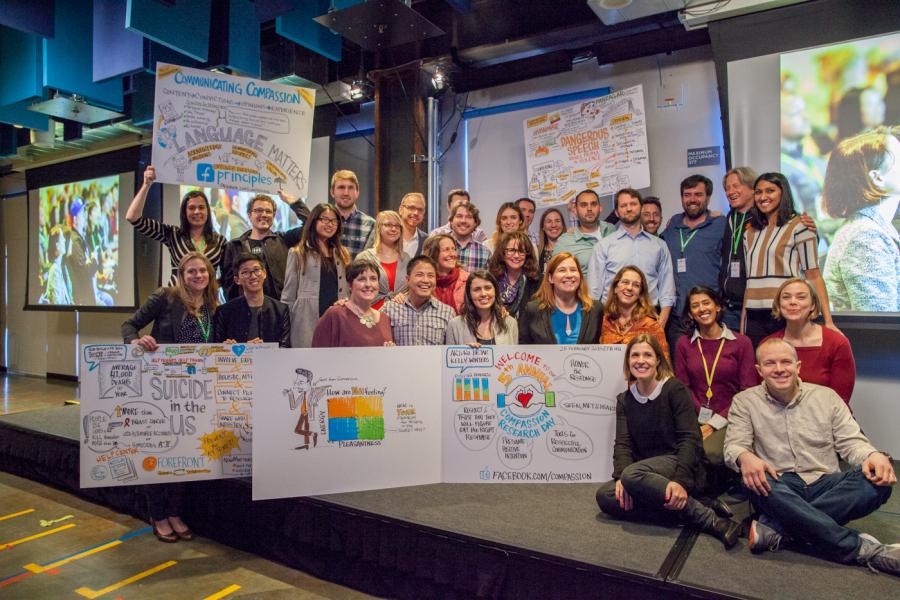

Forefront and Facebook launch suicide prevention tool
As the world’s biggest social network, with more than 1.39 billion users, Facebook is uniquely positioned to provide online resources and support to help people at risk for suicide. That’s the goal of its new collaboration with Forefront to improve support for people expressing potentially suicidal thoughts and online friends who see and report those posts.
The enhanced tools were unveiled at the fifth annual Compassion Research Day, Feb. 25, at Facebook’s headquarters in Menlo Park, California. Forefront’s faculty director Jenn Stuber and research scientist Ursula Whiteside shared the stage with content development team members and provided context for the initiative to provide clear, kind messages and options for people in distress. View the team’s presentation, “Connecting People Who Care,” here.
the team’s presentation, “Connecting People Who Care,” here.
The announcement was reported by more than 150 news organizations worldwide, a small sample of which are linked from Forefront in the News and Prof. Randal Beam’s Insight Blog post. Many news organizations also used part or all of the video created by Mimi Gan, David Friedle and Mark Morache.
The updates are being rolled out to U.S. users over the next few months, said Facebook Safety project manger Rob Boyle. A person who sees a post that suggests its author might be considering suicide will be able to click on a dropdown menu and report the post to Facebook and activate a series of responses. The person who flags the post will see a screen with links that prompt them to message the person about their concern, contact another Facebook friend for support or connect with a trained professional at a suicide helpline for guidance.
Facebook will then review the reported post. If the poster is thought to be in distress, a series of screens will launch automatically when that person next logs onto Facebook, with suggestions for getting help. The responses link to a number of positive options, including videos from Now Matters Now, an online program started by Whiteside, which uses real-life accounts of people who have struggled with suicidal thoughts to provide research-based coping strategies.
The tools aim to both direct suicidal people to resources and alternatives and also guide concerned friends or family members through a situation most are simply not equipped to handle.
“Often, friends and family who are the observers in this situation don’t know what to do,” said Holly Hetherington, a Facebook content strategist working on the project. “They’re concerned, but they’re worried about saying the wrong thing or somehow making it worse. Socially, mental illness and thoughts about suicide are just not something we talk about.”
“We realized there’s a lot we don’t know. We are by no means experts in this space,” said Jennifer Guadagno, a Facebook researcher who reached out to Forefront. The organization’s focus on science-based approaches to suicide prevention and its affiliation with one of the world’s top research universities appealed to Facebook, Guadagno said.
“We really loved what the team was doing,” she said. “These are people who really, really care about this and could offer some great insight.”Teams from Facebook and Forefront began working together last fall, starting with discussions that defined and framed the issue. Significantly, the conversations included suicide attempt survivors. These individuals from Now Matters Now were instrumental in helping Facebook understand the spectrum of suicidal thoughts and how language commonly used around suicide can be insensitive — for example, saying someone “commits” suicide, the same term used for carrying out a crime.
Including attempt survivors in the development process was a game changer, said Whiteside, who led the Forefront team and has herself struggled with suicidal thoughts. “Historically, these people have not been at the table when important decisions were made about them.”
Edwina S. Uehara, dean of the UW School of Social Work, praised the initiative. “We are very proud of Forefront and excited about the difference that the Facebook-Forefront partnership can make for millions of people who struggle with thoughts of suicide,” she said
“It’s an amazing collaboration,” agreed Stuber at the end of the whirlwind week. She said Facebook has an opportunity to increase social media’s value as a force for good.
“In the world of suicide prevention, we know that being connected is a protective factor,” she said. “People are on Facebook 24/7, so there’s an opportunity to actually connect someone who is struggling with a person they have a relationship with. Facebook is extremely proactive in what they’re trying to do. ”
The Facebook tools can be used by anyone, said Forefront operations manager Stephen Miller, who wishes he’d had them available five years ago when a classmate posted what turned out to be a despairing farewell.
“You don’t need to have a degree to be able to meet somebody where they are in their pain and connect them to a resource,” he said.
“You just need to know that there’s somebody who can help you facilitate that connection, and that’s what the Facebook project has the ability to do. This has the potential to save so many lives.” — by Deborah Bach and Sue Lockett John